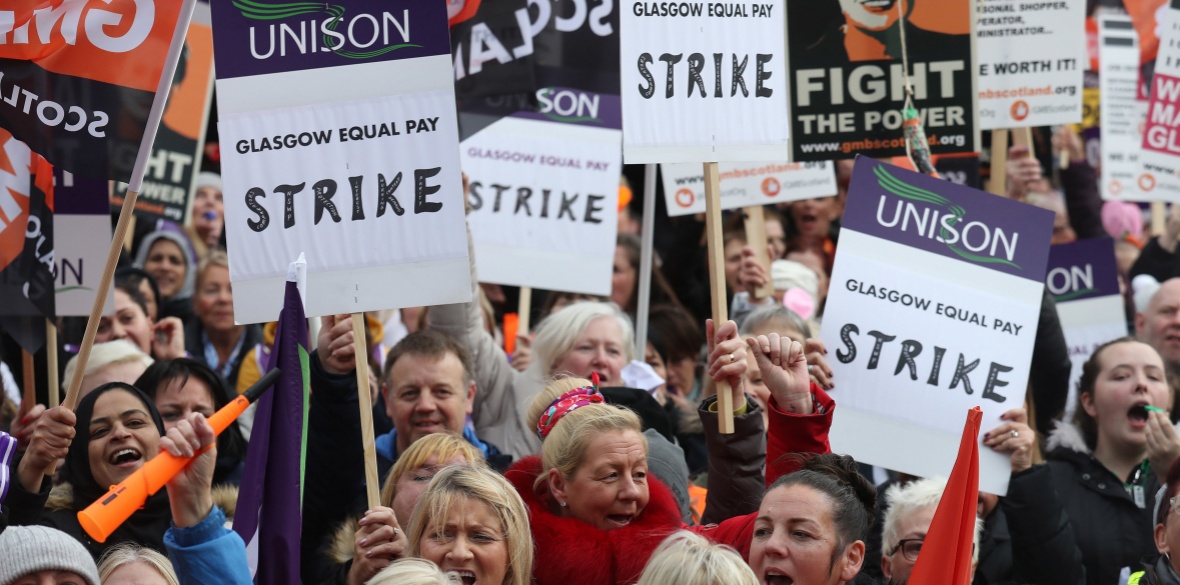This is the last article you can read this month
You can read more article this month
You can read more articles this month
Sorry your limit is up for this month
Reset on:
Please help support the Morning Star by subscribing here
Is it too much to hope that the message that we can fight austerity is at last getting through? Maybe not, with even the Tories trying to court public opinion by pretending they are ending it.
Certainly local government workers in Scotland seem to have got the message with their resounding rejection of a 3 per cent pay offer, which does nothing to make up for the £4,000 on average they have lost since 2010.
That was a consultative ballot and the Tory legal obstacles may yet make life difficult with the 50 per cent formal ballot threshold to take action.
But surely Unison delegates meeting today in Glasgow can take heart from, and capitalise on, the teachers' 98 per cent vote to reject a similar offer on a huge 74 per cent turnout.
But before we get too carried away, we still have work to do to convince many people that the money is there for a decent pay rise, it is just in the wrong hands.
Winning arguments like this over the years has not been easy. Unions have campaigned, fought the battles and seen too many defeats, only to be proved right in the end.
We need to shout out loud that we were right then, as we are now, and use that to build confidence for action.
Way back in 1988 NALGO argued against the contracting out of public services. We warned that service needs would be trumped by profits. Over the years we have seen the impact of that privatisation on services. We have seen the profit motive take precedence and the quality of services to our most vulnerable slashed, the staff underpaid, undertrained and undersupported.
We warned against the privatisation of railways and of utilities and against PFI and PPP that have become a millstone around the necks of public services, in just the way we said would happen.
Our “I told you so’s” ring very hollowly though, as the people behind these policies are long gone, up the greasy pole to the next opportunity to increase their personal wealth even as the rest of us pay the price.
Despite our best efforts, our warnings have often fallen on deaf ears or never even got to the ears of the people worst affected, muffled by a media that has become more and more owned and run by big business who are the ones benefiting from such policies.
So it has been with austerity. Since the crash it has been the unions warning that austerity won’t work. In 2010, in a bid to get the message out to our members, Unison Scotland ran a campaign headed, “Spread the word — there is no need for austerity.”
We promoted key messages to our members and the wider public that not only was austerity unnecessary, it was bad for the economy.
We warned that the economy depends on a healthy public sector. That if jobs and wages are cut, then tax receipts will plummet.
And we warned that we were not all in this together, that austerity will hit the poorest much harder than the rich.
It was so hard to get those messages out though. The Tories had already begun the task of demonising the poor — benefits claimants, migrant workers, single parents, people with disabilities. A divide-and-rule tactic that would allow them to bring in the hostile environment policy; Draconian benefits changes like the two-child policy and changes to disability benefits that have wreaked such havoc in people’s lives.
We have seen all we feared most come to pass. Public services slashed and sold off, pay cuts, child poverty rising massively and dependence on food banks becoming the norm for many. An immense growth in homelessness and rough sleeping. A huge rise in insecure labour as big business and privatised services take advantage of a low wage economy.
At the same time the richest have seen their wealth rise dramatically. The recent report by the UN rapporteur Philip Alston shows the depths to which the UK has sunk through political choices. Now 20 per cent of the population live in poverty, many of them children, in the world’s fifth richest economy.
This is the background to the pay negotiations between Scotland’s councils and the joint trade unions. For too long a key part of Tory austerity has been an attack on council services and our members’ pay and jobs. Despite the rhetoric the Scottish government has passed on these cuts and more.
Rising numbers of our members now depend on top-up benefits, struggling to make ends meet. Relying on food banks to feed their children. Even the better off — the squeezed middle — are feeling the pinch.
And our local economies are paying the price. Shops closing in high streets across the country because the people who spend in their communities are cash poor, to be replaced by charity shops and pawn shops.
It has taken a long time for the unions’ message to get through, but it does seem as if people are beginning to wake up.
Our challenge now, as we try to build confidence for action on pay, is to keep taking these messages out to our members. Social media, leaflets, posters and all the rest have an important part to play, but the key is getting the face-to-face debate into the workplaces and organising from there.
Kate Ramsden is a Unison NEC member and children’s rights officer











